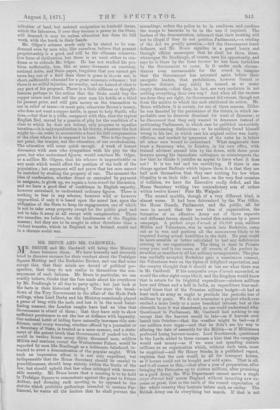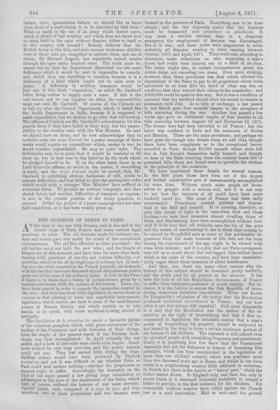MR. BRUCE AND MR. CARDWELL.
AlitBRUCE and Mr. Cardwell will bring this Ministry down between them. We have honestly and sincerely tried to discover excuses for their conduct about the Trafalgar Square Meeting and the Berkshire Review, and can find none except this, that their minds are devoid of political per- spective, that they do not realize to themselves the con- sequences of such failures. Mr. Bruce in particular, we can readily believe, thinks that the fuss made about his overthrow by Mr. Bradlaugh is all due to party spite ; but just look at the facts in their historical setting Ever since the break- down of the Tory Government in the affair of the Hyde Park railings, when Lord Derby and his Ministry consciously played a game of brag with the mob, and lost it in the most humi- liating manner, the London roughs have had an idea that Government is afraid of them ; that they have only to show sufficient persistence to set the law at defiance with impunity. Our national habit of hiding force naturally increases this con- fidence, until every warning, whether offered by a journalist or a Secretary of State, is treated as a mere menace, and a state- ment of the patent truth that Government, if pushed too far, could in twelve hours array thirty thousand men, soldiers Militia and marines, round the Westminster Palace, would be regarded by men like Bradlaugh as a deliberate falsehood, in- tended to avert a demonstration of the popular might. With such an impression afloat it is not only expedient, but indispensable that the Home Secretary should be careful to punctiliousness, should keep strictly within the limits of the law, but should uphold that law when infringed with inexor- able severity. Mr. Bruce hears that a meeting is to be held in Trafalgar Square to remonstrate against the grant to Prince Arthur, and deeming such mooting to be opposed to the statute which prohibits gatherings intended to menace Par- liament, he warns all the leaders that he shall prevent the assemblage, orders the police to be in readiness, and. confines the troops to barracks to be in the way if required. The leaders of the demonstration, informed that their meeting will not be illegal if they do not petition Parliament,—a reading of the Act we greatly question,—bid the Government frank defiance, and Mr. Bruce signifies in a grand hurry and through official messengers that he shall let them alone, whereupon Mr. Bradlaugh, of course, uses his opportunity, and says he is there by the lions because he has been forbidden by the Government to come. Is it under such circum- stances even unreasonable for the crowd to imagine that the Government has retreated again before their energetic leaders, that prohibitions, however formal or however distinct, may safely be treated as so many empty threats,—that they, in fact, are very moderate in not settling everything their own way ? And when all the excuses are done they are right, for Government did retreat, though not from the motive to which the mob attributed its action. Mr. Bruce withdrew, it is certain, for one of three reasons. Either he was daunted by the persistence of the rioters, in which im- probable case ho deserves dismissal for want of firmness; or he discovered that they only wanted to denounce instead of petitioning Parliament, in which case he quibbled unworthily about unmeaning distinctions ; or he suddenly found himself wrong in his law, in which case his original action was hasty, officious, and marked by ignorance of the rules he is before all other men bound to understand. What magistrate dare trust a Secretary who, in London, in his own office, with trained advisers around him by the dozen, with three great lawyers among his immediate colleagues, so misinterprets the law that he thinks it justifies an appeal to force when it does not ? It is too bad and too mortifying. If there is one charge against Radicals which injures them it is that they are half mob themselves, that they care nothing for law when illegality is on their side ; and here, on the very first occasion of collision, we have the Executive coolly defied, and the Home Secretary writing two contradictory sets of orders within twelve hours Poor Mr. Walpole The second muddle, though of a very different kind, is almost worse. It had been determined by the War Office, the Horse Guards, Parliament, and the public, all for once in accord, that the new idea of organization, the formation of an effective Army out of three separate and different forces, should be tested this autumn by a peace campaign. A perfect cops d'arine's of 30,000 men, soldiers Militia and Volunteers, was to march into Berkshire, camp out as in war, and perform all the manceuvres likely to be required during actual hostilities in the field. No plan could be more sensible or better calculated to test any deficiencies existing in our organization. The thing is done in Prussia every year, and is one cause, at all events, of the perfect in- struction so manifest in all her military arrangements. The plan was cordially accepted, Berkshire gave a unanimous consent, the Volunteers were on the tiptoe of delighted expectation, and the country thought that it should at last see what there was in Mr. Cardwell. If his composite corps cl'arinde succeeded, so would the other eight corps like it, and the kingdom would know that in return for its frightful expenditure—sixteen millions here and fifteen and a half in India, an expenditure four-and- a-half times that of the Prussian military budget—it had at least such an army as ought to preclude the periodic loss of millions by panic. We do not remember a project which over excited a more lively or a more beneficial interest, but at the eleventh hour it was abandoned, no one could understand why. Questioned in Parliament, Mr. Cardwell had nothing to say except that the harvest would be late—as if harvest ever lasted into October—that the weather might be bad—as if our soldiers were sugar—and that he didn't see his way to altering the date of assembly for the Militia—as if Militiamen preferred losing harvest-money. Lord Northbrook, questioned in the Lords, added to these excuses a hint that the campaign would cost money—as if we were not spending sixteen millions on an organization which, without such tests, must be empirical—and Sir Henry Storks, in a published report, explains that the cost would be all for transport horses, as if horses could not be bought and sold again. That is all, and it all comes to this,—that after a year of preparation, after bringing the Estimates up to sixteen millions, after promising us a good Army, the War Department cannot move a single corps d'artne'e half across England without incurring new ex- pense so great, that in the teeth of the roused expectation of the whole country they hesitate before such an outlay. The British Army can do everything but march. If that is not
failure, utter, ignominious failure, we should like to know what short of a capitulation is to be described by that term ? What on earth is the use of an army which cannot move, which is afraid of bad weather, and which does not know how to camp itself in the open without disaster, either to itself or to the country folk around I Nobody believes that the British Army is like this, and such excuses must seem childish even to those who are compelled to endorse them, and one of whom, Sir Edward Lugard, has repeatedly moved armies through the open under tropical rains. The truth must be, cannot but be, that the Department discovered too late some deficiency which it would be next to impossible to remedy, and which they are unwilling to mention, because it is a deficiency of a kind which ought not to exist even in peace. A deficiency in artillery transport would be just one of this kind, "requisition,' on which Mr. Cardwell relies, being useless to supply such a want. If this is the real reason, and we can imagine no other, the responsibility must rest with Mr. Cardwell. Of course all the Colonels are in full cry after the Control Department, which is hated like the Audit Department in India, because it is supposed to resist expenditure, but we decline to go after that red-herring. The officers of Control are Mr. Card well's subordinates, let him punish them if they have failed in their duty, but the respon- sibility to the country rests with the War Minister. He said we should have an Army, and he now acknowledges that to mobilize even one cmps d'armde for a peace campaign of three weeks would require an expenditure which, except in war, he would consider unjustifiable. He may be quite right. The deficiencies may be so great that it would be wasteful to fill them up, but in that case he has failed to do the work which he pledged himself to do. If, on the other hand, there is, as Lord Granville affirms, no secret in the matter, if everything is ready, and the corps d' armee could be moved, then Mr. Cardwell is exhibiting obvious feebleness of will, yields to minute difficulties, and has failed to give the peremptory order which would with a stronger War Minister have sufficed to overcome them. To promise an autumn campaign, and then shrink before bad weather, difficulties of transport, or expense, is not, in the present position of the Army question, to succeed. Either the project of a peace campaign had not been half considered, or it has been weakly given up.

































 Previous page
Previous page